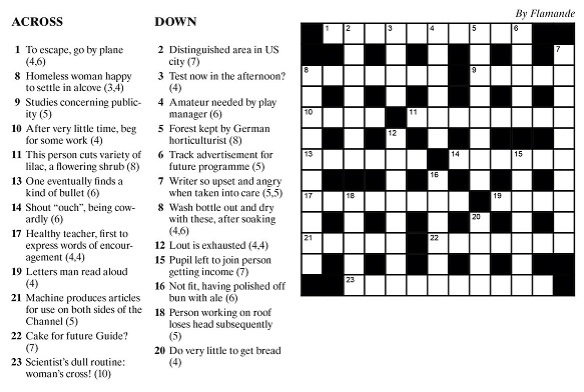
[Image courtesy of Amazon. The Times Cryptic Crossword Book.]
On Twitter yesterday, Oliver Roeder from FiveThirtyEight asked, “If one wanted to learn/practice solving cryptic crosswords, with what puzzles should one begin?”
Most of the replies mentioned different cryptic crossword outlets to try out, like The Nation, Harper’s Magazine, and The UK Times Quick Cryptic Crossword Book. The Nation in particular was recommended as a good starter cryptic.
Monthly offerings from constructors like Andrew Ries and Cox & Rathvon were also mentioned, though I would add Patrick Berry’s Son of the Crypt cryptic collection to the list of suggestions. (I would normally also recommend The Guardian because of their great cryptics, but they’re pretty tough, particularly for beginners.)
This, of course, presumes that Roeder meant which cryptic puzzles one should start with.

[Image courtesy of The New European.]
It occurred to me that he might be asking what OTHER puzzles are good for beefing up your cryptic crossword solving game.
Given the different kinds of clues used in cryptic crosswords, I have a few suggestions.
1. Anagram puzzle
Anagrams are a staple of cryptic cluing, and any puzzler looking to get into cryptics should have some facility with them. There are plenty of ways to practice — the Jumble, Anagram Magic Square and other puzzles from our friends at Penny Dell Puzzles, and even Bananagrams, Words with Friends, or Scrabble will help build your anagram skills.
2. Rebus
Rebus puzzles are all about adding and subtracting letters to form words or phrases, and there’s plenty of that in cryptic cluing. This is a good way to get used to breaking down longer words into abbreviations, anagrams, and so on in order to puzzle out the answer to a cryptic clue.
3. Brain teaser/riddle
Many cryptic clues rely on words with multiple meanings, as well as words that serve as both instructions and hints. Brain teasers and riddles employ similar wordplay, and they can help you develop a proclivity for looking at words from a new point of view.

[Image courtesy of Eastern Daily Press.]
Of course, if you want help learning to decipher the many variations on cryptic crossword cluing that you’ll encounter, there are some great resources out there.
Penny Dell Puzzles has a PDF containing examples of the most common cluing tricks, and you can bolster that with similar insights from Wikipedia and The Nation.
If you’re looking for deeper dives into all sorts of cryptic cluing, my one-stop shop for insight is The Guardian’s crossword blog. They offer regular features breaking down various kinds of cryptic clues.
In the last few weeks alone, they’ve covered cycling clues, “stuttering” in clues, and how the points of the compass can be used in cluing, and there are dozens of similarly illuminating posts in their archive.
It’s a terrific resource for newbie cryptic solvers and established puzzlers alike.
And it’s worth getting into cryptic crosswords, if only for the occasional subversive little Easter egg like this one from yesterday’s The Guardian cryptic:

Did I miss any resources or outlets for great cryptic crosswords? Let me know in the comments section below! I’d love to hear from you!
Thanks for visiting PuzzleNation Blog today! Be sure to sign up for our newsletter to stay up-to-date on everything PuzzleNation!
You can also share your pictures with us on Instagram, friend us on Facebook, check us out on Twitter, Pinterest, and Tumblr, and explore the always-expanding library of PuzzleNation apps and games on our website!







